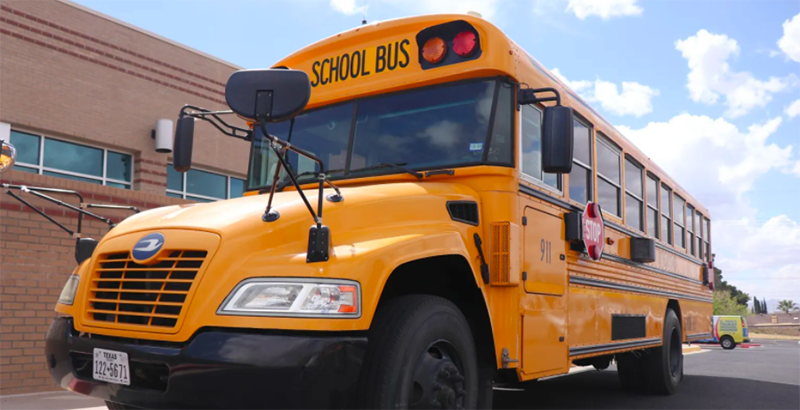Texas School Districts Consider Switching to Electric Buses Using $5 Billion in Federal Funds

Get stories like these delivered straight to your inbox. Sign up for The 74 Newsletter
It’s not exactly “The Magic School Bus,” but the federal government is promoting options for electric and lower-emission buses for school fleets in and around El Paso, Texas.
U.S. Rep. Veronica Escobar, D-Texas, and EPA officials introduced the Clean School Bus Program which will allocate $5 billion over the next five years to replace school buses around the country, thus reducing emissions.
Escobar was joined by EPA Region 6 Administrator Earthea Nance at the March 21 announcement.
The EPA is still building the program, Nance said, so many of the details and rules for application will be clarified after the final guidelines are released in April.
The $5 billion federal budget for the program dwarfs the agency’s spending on the traditional school bus replacement program, as the $1 billion annual budget is 100 times greater than the $10 million annual average for the last five years.
Nance said the program will mitigate public health problems for millions of people caused by burning diesel, and reduce climate change impacts.
“Students are particularly vulnerable to air pollution inside and near older diesel school buses, these pollutants increase children’s (risk) of asthma and other respiratory illnesses,” Nance said. “Children are not the only ones at risk, bus drivers and other school staff are also exposed to diesel exhaust pollution.”
Congress passed the Bipartisan Infrastructure Law in November 2021 which funds the EPA’s Clean School Bus program. The EPA will dedicate half of the funding — about $438 million a year — to purchasing zero-emission electric buses. The other half will support purchasing “clean school buses” encompassing both fully electric options but also buses that burn alternate fuels to diesel (such as propane, liquefied natural gas, hydrogen or biofuels).
The federal government will pay up to 100% of the cost for replacing the buses, as well as installing charging or refueling stations. Eligible recipients include local governments, school districts, tribal schools, and contractors (for profit and nonprofit) that sell buses.School districts that have already invested in clean buses can apply for electric buses, Nance said.
Unlike previous programs, Nance said one requirement of the program requires that 40% of the benefits go to disadvantaged minority, rural or poorer districts.

“For far too long, too many communities in particular, low-income communities and communities of color, suffer disproportionately from poor air quality and high levels of air pollution, and the devastating health impacts from breathing unhealthy air,” Nance said.
In an interview, Nance said she couldn’t answer if El Paso’s school districts would be prioritized in funding considerations until the final rules are released in April.
“We don’t have all the components of the program yet, but we’re getting that buy-in and excitement, but then not have all the details for you,” Nance said. “We’re walking that line right now.”
Officials from Anthony, Canutillo, San Elizario, Tornillo, Ysleta, Clint and Socorro school districts attended the March 21 session.
No representatives from El Paso Independent School District, the region’s largest public school system, attended because of late notice of the event, spokesperson Gustavo Reveles said. He added that the district is “excited about the potential” of the program.
“(EPISD) will further look into the program to determine the feasibility and requirements to apply for funding,” Reveles wrote in an email.
EPISD has a fleet of 285 buses, all in operation. Those buses are “low-emission” propane powered with the exception of 12 small activity buses, Reveles said.

Many of those buses are new, purchased in 2016 when the district spent $8.4 million of its $669 million bond to buy 81 new buses. The average age of the fleet is five years old, Reveles said.
Nate Carman, who started as the superintendent at Socorro Independent School District last week, said the meeting was exciting for the district.
“I feel hopeful that there are funds available for us to be able to get some buses that will help with the clean air initiative and operate more efficiently,” he said.
Socorro ISD has 299 buses, with 36 currently out of service, according to SISD spokesperson Daniel Escobar. The buses range in age from 24 years to just under a year.
Escobar said the district purchased 30 lower-emission buses two years ago. Ten of those were bought with district funds to serve students with disabilities, costing $950,000. The remaining 20 buses used a mix of grant and district funds to split the $2.1 million cost, he said.
YISD Superintendent Xavier DeLaTorre said last month that the district needed more information before applying.
“The devil is in the details, of course,” DeLaTorre said. “We have to take inventory of our current bus supply and see how many of the buses would actually qualify and how many buses we’d actually be willing to dispose of to secure an electric bus.”
This article first appeared on El Paso Matters and is republished here under a Creative Commons license.![]()
Get stories like these delivered straight to your inbox. Sign up for The 74 Newsletter

;)